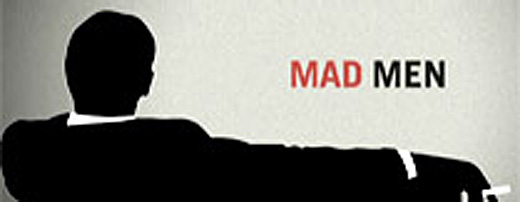Mad Men Note: This Is How It's Going to Be

Deny it if you can: when Don Draper orders his brother-in-law, William, to fall into line with his plan for taking care of Betty’s father, you’re thrilled. What gives Don such power? Like a good curry, Don’s authority is a compound of many ingredients. One of these is his manner: he believes in whistling happy tunes (so to speak). Another is his torpedo-esque acquisition of targets’ weaknesses. Way beyond Santa, Don knows how people have been naughty, and how they’ve been nice. In any case, Don’s display of primacy among his wife’s family (he has none of his own, of course) dilates the focus of a sorry, everyday elder-care problem to the scope of a ducal fiat. “The Private Life of the Medici” is what Kathleen and I were both thinking.
A friend writes,
Oh man, i just watched this for the first time tonight — what a weird show! Â i’m so sorry you had to live through that time, if its anything close to what reality was. Â So creepy!
Although I guess one day they’ll make a show about the 1980’s and i’ll say the same thing to someone 20 years younger than me.
Yes and no. Yes, a show about the 1980s will doubtless have to be explained to younger viewers. But it will probably not be “creepy.” What’s creepy about Mad Men is the vividly illustrated decay of conventional mores. Nobody believes in anything beyond appearances, because appearances are always the last thing to be abandoned. The meaning behind respectable life has been moribund since the show began, in 1960; it will die when the first oral contraceptive is consumed by a female character in the solitude of her own bathroom.
Why the old timber began visibly to fall during the Kennedy Administration is a scholar’s problem. (I won’t bore you with my hypotheses.) It wasn’t that a way of life came to an end — not at all. What came to an end was a way of pretending to feel about a way of life that very few people actually followed. Why did women still wear gloves in 1963 — no matter what the weather? Impractical white gloves, at that. Who were they kidding? Not themselves.
But I hope that this show about the Early Sixties is explaining what happened in the Late Sixties. The world could stand only so much bogus. Find one character in Mad Men who is comfortable with “the way things are,” and I’ll be damned if you can find two.
This evening’s Madison Square Garden subplot was very hard for me to watch. I wanted to run out into the night and disinter the corpses of executives who dreamed up the destruction of a great civic building and its replacement by the sorriest sort of postwar “modernism.” Madison Square Garden serves as a reminder that, in the Sixties, many New Yorkers wanted their city to look more like the cereal-boxed towns to the west. Places like Omaha and Dallas never resorted to the ziggurat-happy zoning laws that became popular in New York City after the Equitable Building, at 120 Broadway, blotted out the sun for buildings all the way up to City Hall. (Think on’t, my chicks.) The idea that the erection that is Pennsylvania Station’s latest incarnation could ever have struck more than two sane people as an improvement on any level is a terribly sad comment on the fraily of human understanding.Â
You might say that, if New Yorkers could be so mistaken about their own urban welfare, then the nation as a whole was bound to run off the rails.
